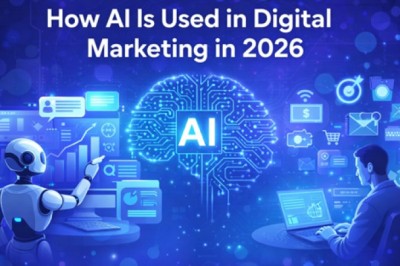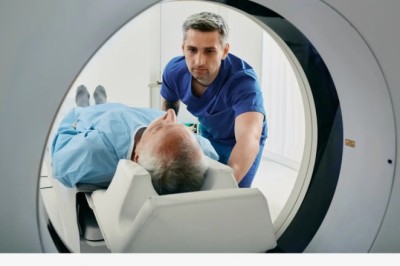views

In recent years, the healthcare industry has witnessed a surge in technological advancements that promise to enhance patient care. Among these, Artificial Intelligence (AI) has emerged as a powerful tool, capable of transforming how data is managed and utilised in healthcare. However, for AI to deliver its full potential, it must be tailored to the specific needs of the healthcare sector. Fit-for-purpose AI, combined with open standards, offers a path to improved patient care by enabling better data management, analysis, and integration across systems.
The Challenges of Healthcare Data Management
Healthcare generates vast amounts of data daily, from patient records and clinical trials to imaging and lab results. The challenge lies in the fact that this data is often siloed, unstructured, and stored in disparate systems. This fragmentation makes it difficult to access and analyse data effectively, leading to delays in care, misdiagnoses, and inefficient use of resources.
Moreover, the complexity of healthcare data adds another layer of difficulty. Patient data includes a wide range of information, such as demographic details, medical histories, treatment plans, and outcomes. Each data point can vary in format, structure, and quality, making it challenging to create a cohesive and usable healthcare data model.
The Role of Fit-for-Purpose AI in Healthcare
Fit-for-purpose AI refers to AI systems specifically designed to meet the unique needs of a particular industry or application. In healthcare, this means developing AI models that can understand and process the nuances of medical data. Unlike generic AI models, which may struggle with the intricacies of healthcare data, fit-for-purpose AI is tailored to handle the complexity and variability inherent in patient information.
These specialised AI systems can automate routine tasks, such as data entry and coding, freeing up healthcare professionals to focus on patient care. Additionally, fit-for-purpose AI can enhance clinical decision-making by providing real-time insights based on comprehensive data analysis. This improves the accuracy of diagnoses, tailors treatment plans to individual patients, and ultimately leads to better outcomes.
For example, Piano Data Automation is one such tool that leverages AI to streamline data management in healthcare. By automating data entry and integration processes, it reduces the burden on healthcare workers and ensures that patient information is accurate and up-to-date. This not only improves operational efficiency but also enhances the quality of care provided to patients.
The Importance of Open Standards in Healthcare
While fit-for-purpose AI is essential, it cannot function effectively in isolation. Open standards play a critical role in ensuring that healthcare data is accessible, interoperable, and secure across different systems. Open standards are universally accepted protocols that enable different software and systems to communicate and exchange data seamlessly.
In healthcare, open standards ensure that data from various sources, such as electronic health records (EHRs), lab systems, and imaging software, can be integrated into a unified healthcare data model. This interoperability is crucial for providing a complete view of a patient's health, which is necessary for accurate diagnosis and treatment.
Furthermore, open standards support data security and privacy by establishing consistent protocols for data handling. This is particularly important in healthcare, where patient information must be protected under strict regulations. By adhering to open standards, healthcare organisations can ensure that patient data is secure while still enabling the flow of information needed for effective care.
The Integration of Fit-for-Purpose AI and Open Standards
The integration of fit-for-purpose AI and open standards holds immense potential for transforming healthcare data management. When AI models are developed using open standards, they can easily interact with other systems and datasets, providing more accurate and comprehensive insights.
For instance, a fit-for-purpose AI system designed to analyse clinical data can be integrated with EHRs, lab results, and imaging data from different systems using open standards. This integration allows the AI to process a broader range of information, leading to more accurate diagnoses and personalised treatment plans. The use of open standards also ensures that this AI-driven analysis is transparent and replicable, which is essential for maintaining trust in AI-powered healthcare solutions.
Moreover, the combination of AI and open standards can accelerate innovation in healthcare. By creating a standardised framework for AI development and data integration, healthcare organisations can collaborate more effectively, share insights, and develop new solutions that improve patient care.
Overcoming Barriers to Adoption
Despite the clear benefits, the adoption of fit-for-purpose AI and open standards in healthcare faces several challenges. One of the primary barriers is the lack of standardisation across the industry. While open standards exist, they are not always widely adopted or consistently applied. This inconsistency can hinder the interoperability of systems and limit the effectiveness of AI-driven solutions.
Additionally, there is often resistance to change within healthcare organisations. Implementing new technologies, especially those as transformative as AI, requires significant investment in training, infrastructure, and change management. Healthcare providers may be hesitant to adopt these new systems without clear evidence of their benefits.
To overcome these barriers, it is essential to demonstrate the tangible value of fit-for-purpose AI and open standards. Pilot projects and case studies can showcase how these technologies improve patient outcomes, reduce costs, and enhance operational efficiency. Additionally, regulatory bodies and industry leaders must advocate for the widespread adoption of open standards to ensure that healthcare systems can communicate and share data effectively.
The Future of Healthcare Data Management
As the healthcare industry continues to evolve, the role of AI and open standards in data management will only grow in importance. The integration of fit-for-purpose AI with open standards will enable healthcare organisations to harness the full potential of their data, leading to more accurate diagnoses, personalised treatments, and improved patient outcomes.
In the future, we can expect to see AI models that are even more tailored to specific healthcare applications, from predicting patient outcomes to identifying new treatment options. These models will be developed using open standards, ensuring that they can interact seamlessly with other systems and datasets. This will create a more connected and efficient healthcare ecosystem, where data flows freely and is used to its fullest potential.
Additionally, as AI becomes more integrated into healthcare, it will play a crucial role in addressing some of the industry's most pressing challenges, such as the rising cost of care and the growing demand for personalised treatment. By automating routine tasks and providing real-time insights, AI can help healthcare providers deliver higher-quality care at a lower cost.
Conclusion
The transformation of healthcare data management through fit-for-purpose AI and open standards represents a significant opportunity to improve patient care. By developing AI systems that are specifically designed for healthcare and ensuring that they are built on open standards, we can create a more connected, efficient, and effective healthcare system.
This approach will not only enhance the quality of care provided to patients but also empower healthcare professionals with the tools they need to make better decisions. As we continue to advance in this direction, the integration of AI and open standards will become the cornerstone of modern healthcare, driving innovation and improving outcomes for patients around the world.






















Comments
0 comment